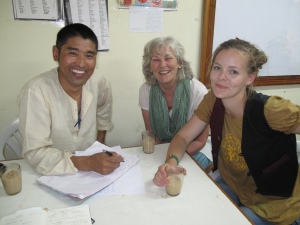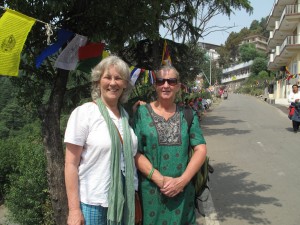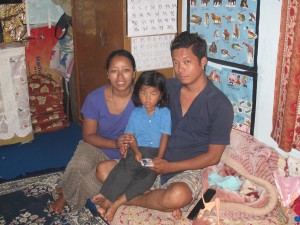
My time in McLeod Ganj is already half way through.
So far it’s been a mixture of what I expected (this is my third time in India) with a lot of surprises thrown in.
McLeod Ganj is a bustling town full of Indians, Tibetans, Westerners and goodness knows who else, living in peril of being mown down by maniacal drivers and motorcyclists.
For some reason traffic has right of way down these tiny streets teeming with people and shops. It’s remarkable so few get injured – not that I’ve seen, anyway.
The town is particularly crowded at the moment because the Dalai Lama is in residence and will be teaching at the Temple this weekend. I was quick off the mark (others have queued for two to three hours) and got my security pass as soon as the office opened.
An officious Indian administrator (or maybe they were Tibetan) stapled my photograph to a flimsy pink piece of paper, stamped it and encased it in a plastic cover, all for 10 rupees (about 40p).
Once that was safely in my pocket, I began to look at what else McLeod Ganj has to offer apart, of course, from my teaching commitments.
Shopping is number one. Every spare inch of pavement is flanked by a shop, a stall, a beauty parlour, a cafe, a hotel or an ATM.

The stalls offer an array of colourful cheap clothes and jewelry, probably imported from China. The shops are more discerning, but expensive. However, after a few days, everything begins to look the same, and you may not be so affected by the pleas to buy.
My personal weakness is massage and reflexology. It’s on offer everywhere. But one does have to be careful.
I had an entertaining time in a barber’s shop which also claimed to be a beauty parlour. The barber gave me a wonderful foot massage, but the room was grimy, my chair uncomfortable, and goodness knows where the water for my foot bath came from.
Eventually I found Mr Fish at the top of Temple Road, owned by a delightful Indian woman. She is very reasonably priced, and apart from hairdressing, massage, facials and threading (hair removal), she offers a tank of water containing tiny fish which give you the weirdest pedicure in the known universe.

It’s feels like you’ve plunged your feet into a bed of stinging nettles, but these little water creatures do a great job nibbling away all the dead skin from your toes and heels.
You’re meant to feel invigorated during it, but I couldn’t help picturing piranhas in my head.
Mind you, after a visit to the local post office, I would opt for an encounter with a couple of piranhas any old time.
First, I had to find someone to pack up the goodies I wanted to send home. The Indian who did it was a master craftsman. It took him under five minutes to create the neatest parcel I have ever seen, sewn in calico and stamped with a wax seal, all for 70 rupees.
Then off to the post office itself to obtain a customs form. Typical of India, it involves strict protocol and a visit to a musty office next door, accessed via a flight of steps specifically designed, I suspected, to break your neck.
I returned triumphant, only to learn that I needed a photocopy of my passport as well. Grrr!

So it was back up those death-defying steps to the musty office where a cranky administrator had to give the photocopier a hefty blow before it groaned into life.
Paperwork sorted, I handed my parcel over to a disobliging, aggressive young woman at the counter. As I waved it farewell and took in the chaos that surrounded her, I felt compelled to wish my parcel a safe journey with an Indian head wobble and a ‘Bloody good luck to you.’
Time for a spot of R & R.
I headed for the Tibetan Peace café, situated a little further up the street. It’s one of my favourite places to eat, but when I was

ushered through the kitchen to the outside squat loo, I did wonder if my stomach was going to survive.
It has, so far.
Above all, travelling is about the weird and wonderful people you bump into, such as Victoria, a retired American teacher who has been living in McLeod Ganj for some years now. She spends her time working as a volunteer for the Tibetan Museum and accosting Westerners in the street, to inform them about the political situation.
‘I don’t like India at all,’ she told me as we ambled up Temple Road together. ‘I’m only here because I am passionate about helping the Tibetan cause.’
It was difficult to know how to respond to that.
Nevertheless, it’s impossible to ignore the plight of Tibetans, especially when you hear so many harrowing stories from the monks and other refugees.
I spent an hour talking to Lhamo Kyab at the Hope Refugee Mission, who was brought up as a herdsman on the Tibetan plains. He was thrown into prison by the Chinese authorities for dissident activities.
They beat him so badly he lost the hearing in his right ear and his liver was seriously damaged.

After being released he escaped to India, and now lives in McLeod Ganj with his wife and children, and is raising money to make a documentary about what happened to him.
I highly recommend a visit to the mission. They are always looking for people willing to help these refugees learn English.
It’s an hour of my life I certainly won’t forget.







